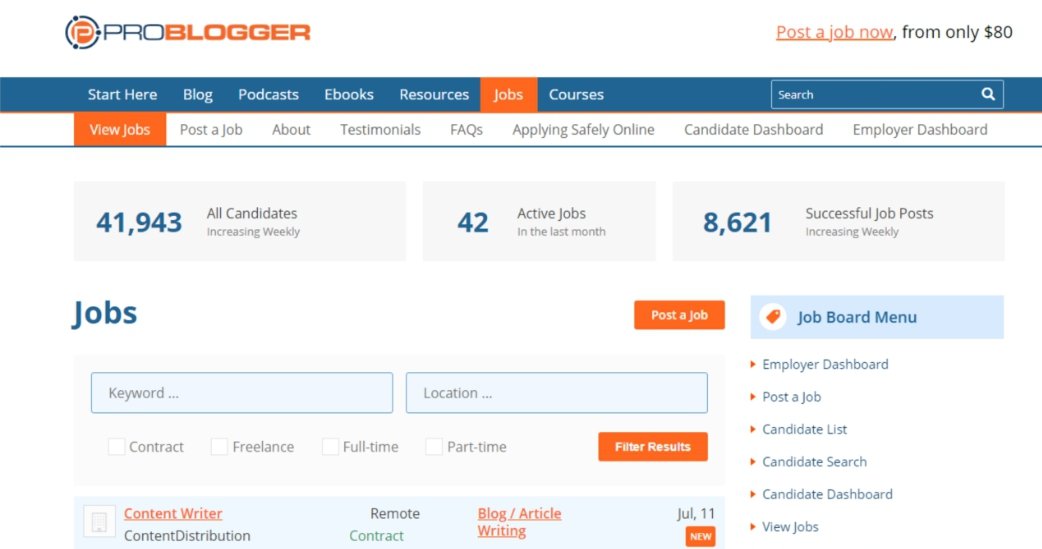With the rise of remote work shaping the modern job market, the effort to fulfill career opportunities outside the traditional office setting has become increasingly common. In this changing era, remote content writing jobs stand out as a sign of possibility for those seeking flexibility, autonomy, and creativity in their professional endeavours.
Remote content writing jobs have emerged as a golden avenue for individuals looking to blend their passion for writing with the flexibility of remote work. But what exactly are these roles? Importantly, remote content writing jobs involve crafting motivating and engaging written content for various platforms and purposes, all while operating from the comfort of one’s own space.
Certain skills and qualifications are key to excelling in this field. You must possess an eye for detail, flawless grammar and spelling, and the ability to adapt your writing style to different audiences, to name just a few requirements. Additionally, employers seeking remote content writers highly value familiarity with SEO principles, proficiency in research, and strong communication skills.
This guide aims to help you secure remote content writing positions, offering actionable ideas and invaluable strategies to empower aspiring writers in their desire for remote work opportunities.
Where to Look for Remote Content Writing Jobs
When it comes to finding remote content writing jobs, knowing where to look solves half the problem. Fortunately, many job boards and freelance platforms are tailored specifically to remote work opportunities, making the search process much more manageable. Here are some of the platforms:
FlexJobs
One of the go-to destinations for remote job seekers is FlexJobs. This comprehensive job board features different remote positions across various industries, including content writing. FlexJobs has a user-friendly feature and advanced search filters that make it easy for you to explore your options and find remote content writing jobs that suit your skills and preferences.
Upwork
Another popular platform you should consider exploring is Upwork. As one of the largest freelance marketplaces in the world, Upwork connects freelancers with clients seeking their expertise. Content writing is in high demand on Upwork, and by creating a compelling profile showing your skills and experience, you can attract potential clients and secure remote writing projects.
ProBlogger
ProBlogger is a must-visit destination for those looking to go deeper into the world of remote content writing. This specialized job board caters specifically to writers, bloggers, and content creators, offering great remote writing opportunities. By regularly checking ProBlogger’s job listings and setting up customized job alerts, you can stay ahead of the competition and secure desired remote content writing gigs.
Indeed and LinkedIn
In addition to these dedicated platforms, you can also explore general job boards such as Indeed and LinkedIn. While these sites may not primarily focus on remote work, they often feature a good number of remote job listings, including content writing roles. By utilizing advanced search filters and targeted keywords, you can discover hidden opportunities and land remote content writing jobs that may not be advertised elsewhere.
Optimizing your search queries and filters is crucial to maximize your chances of success on all these platforms. Start by specifying your desired job title (e.g., “remote content writer”) and setting location filters to “remote” or “telecommute.” Additionally, take advantage of keyword searches to beat down your options based on specific specializations or industries you’re interested in.
Salary and Benefits
Remote content writing jobs come with a sweet salary and juicy benefits. Different organizations offer different salary packages for remote content writers. while salaries may differ between working for agencies, freelance platforms, or directly for companies, remote content writer salaries can also vary depending on the country or region where the writer is located. The average salary is between $50,000 to $79,000 per year, depending on the level of experience. It’s important to do your research on the average salary range for your desired role in your specific location or industry. Websites like Glassdoor, PayScale, and LinkedIn can be valuable resources for gathering this information.
Networking and Building Connections
Networking isn’t just a bonus in the remote content writing world, it’s a necessary ingredient for success. Building connections with fellow writers, industry professionals, and potential clients can open doors to new opportunities, collaborations, and valuable understanding.

Imagine you’re going through your Twitter feed, and you come across a post from a fellow content writer sharing tips on crafting compelling blog headlines. You became interested and engaged with the post, leaving a comment expressing your appreciation for the helpful advice. Little do you know, this simple interaction could be the start of a meaningful professional relationship.
That’s the power of networking in action. By actively engaging with other writers and industry professionals on social media platforms like Twitter, LinkedIn, and Facebook, you can expand your network, stay up-to-date on industry trends, and even uncover hidden job opportunities.
But networking isn’t just limited to online interactions. In-person events such as industry conferences, workshops, and meetups offer invaluable opportunities to connect with like-minded individuals and build meaningful connections. Whether you’re attending a panel discussion on content marketing or meeting at a networking happy hour, don’t underestimate the power of face-to-face interactions in building your network.
In addition to social media and in-person events, online communities and forums dedicated to content writing can also serve as valuable networking hubs. Platforms like Reddit, Quora, and specific forums based on your specialization provide spaces for writers to share knowledge, ask questions, and connect with peers in the industry. By actively participating in these communities and offering valuable insights, you can position yourself as a knowledgeable and trustworthy member of the writing community.
When it comes to networking, consistency is key. Make it a habit to engage with your network regularly, whether it’s through social media interactions, attending industry events, or participating in online communities. By nurturing your connections and fostering genuine relationships, you’ll expand your professional network and create the way for future opportunities in the remote content writing industry.
READ: How to Secure Entry-Level Remote Software Development Jobs
Pitching and Cold Emailing
You’re ready to take the next step: pitching and cold emailing prospective clients and employers. While it may seem difficult at first, mastering the art of pitching and cold emailing is an important skill for any remote content writer looking to secure their dream job.
Let’s go through some effective techniques for crafting personalized pitches and cold emails that will grab the attention of potential clients and employers.
Research
Before reaching out to any company or client, take the time to learn about their business, their target audience, and their content needs. Yes, do your research well. This will allow you to tailor your pitch or cold email to their specific needs and show your understanding of their industry.
Showcase Your Expertise
When crafting your pitch or cold email, focus on the value you can provide. Explain to clients or employers your relevant experience, skills, and achievements and how you can help solve their content challenges or achieve their goals. Be brief yet convincing, and avoid common templates or uninspiring language. Instead, personalize your pitch to prove that you’ve done your homework and are genuinely interested in working with them.
Keep It Brief
In addition to showcasing your expertise, it’s also important to be respectful of the recipient’s time and preferences. Keep your email concise and to the point, and make it easy for them to take the next steps if they’re interested in learning more. Avoid giving them unnecessary information or attachments, and always include a clear call to action inviting them to reach out if they’d like to discuss further.
Of course, there are also some dos and don’ts to keep in mind when pitching and cold emailing in the remote content writing field. Do personalize your emails and pitches for each recipient, follow up if you haven’t heard back after a reasonable amount of time, and be persistent but polite. On the other side, don’t spam recipients with general emails, don’t forget to proofread your emails for typos and errors, and don’t take rejection personally.
READ: Comparing Remote Work Platforms: Which One Is Right for You?
Building a Strong Portfolio
Your portfolio is your secret weapon when it comes to remote content writing jobs. It’s not just a collection of your past work, it presents your skills, expertise, and unique writing style to the employer, setting you apart from the competition. Let’s go straight into why a strong portfolio is important and how to create one that impresses potential clients and employers.
Imagine you’re a hiring manager checking through a number of resumes and portfolios, searching for the perfect content writer for an upcoming project. You come across a portfolio filled with well-crafted blog posts, engaging social media captions, and captivating website copy. You’re impressed by the writer’s ability to adapt to many functions, attention to detail, and ensuring the writing style fits the needs of different platforms and audiences.
That’s the power of a strong portfolio. It proves your writing skills and provides tangible evidence of your ability to deliver high-quality content that meets the needs of clients and appeals to their target audience.
So, how can you create a portfolio that leaves a lasting impression? Start by selecting and organizing your portfolio pieces in order of importance. Choose samples that highlight your strengths as a writer and show your expertise in a specific focus or industry. Whether it’s blog posts, articles, case studies, or website copy, aim for diversity in your portfolio to showcase the greatness of your skills and experience.
Once you’ve come up with your portfolio pieces, it’s time to organize them to make it easy for potential clients and employers to explore. Consider categorizing your samples by industry, content type, or writing style, and provide brief descriptions or context for each piece to give readers an overview of your thought process and approach to writing.
But building a strong portfolio isn’t just a one-time effort, it’s an ongoing process. As you continue to grow and develop as a writer, make sure to continually update and refine your portfolio to reflect your latest work and accomplishments. Remove outdated or less relevant pieces and replace them with fresh samples that prove your current skills and expertise.
READ: Remote Jobs in United Kingdom: Your Path to Flexibility
Exploring the Application Process
After finding some promising remote content writing jobs that you’re eager to apply for, what next? Exploring the application process can sometimes feel like embarking on a journey into the unknown, but fear not! With a little guidance and preparation, you can confidently go through the steps in the application process and increase your chances of landing your dream remote content writing jobs.
Read Job Description
Make sure you carefully read the job description and application instructions. Pay close attention to any specific requirements or instructions outlined by the employer, such as submitting writing samples or completing a skills assessment. Showing that you’ve carefully read and understood the job posting will give potential employers the feeling that you’re detail-oriented and serious about the opportunity.
Compelling Cover Letter
Crafting an inspiring cover letter that showcases why you’re the perfect fit for the role is important. Your cover letter should be personalized to the company and position you’re applying for, highlighting your relevant experience, skills, and enthusiasm for the opportunity. Avoid general cover letters that could apply to any job—instead, tailor your message to address the specific needs and challenges listed in the job description.
Detailed Responses
When responding to application prompts or questions, be sure to provide thoughtful and detailed responses demonstrating your understanding of the topic and showcasing your writing skills. Whether it’s answering questions about your writing process, sharing examples of past projects, or outlining your approach to content strategy, use this opportunity to prove your expertise and stand out from the crowd.
Follow Up
Once you’ve submitted your application, don’t sit back and wait for a response, act without anyone coming to tell you! Follow up with the hiring manager or recruiter to express your continued interest in the position and ask about the status of your application. This shows your initiative and passion for the opportunity and may even prompt the employer to give your application another look.
Throughout the application process, it’s important to maintain open and professional communication with potential employers. Respond promptly to any inquiries or requests for additional information, and be humble and respectful in all interactions. Remember, how you conduct yourself during the application process can leave a lasting impression on potential employers, so make sure to put your best foot forward every step.
Interview Preparation and Success Strategies
Once you make it to the interview stage for a remote content writing job, it’s time to prepare and snatch the opportunity. Interviewing for remote positions comes with its own set of challenges, but with the right preparation and mindset, you can sail through the interview and land the job of your dreams.
Background Check
First, you have to be well prepared by researching the company inside and out, learn about its mission, values, and recent projects. Familiarize yourself with their content style and tone, and take note of any recent news or developments that could come up during the interview. The more you know about the company, the better equipped you’ll be to prove your fit and passion for the role.
Common Interview Questions
While every interview is unique, there are some questions that tend to come up time and time again. Be prepared to talk about your writing experience, your strengths and weaknesses as a writer, and your approach to content strategy. Practice answering these questions out loud, and consider recording yourself to identify areas for improvement.
Present Yourself Well
When it comes to showcasing your skills and experience during virtual interviews, presentation is key. Make sure you’re set up in a quiet space with good lighting and free from distractions. Make sure you test your technology ahead of time to ensure everything is working smoothly. Dress professionally, even if you’re interviewing from the comfort of your own home, and maintain good posture and eye contact throughout the interview.
Don’t be afraid to show your personality and commitment to the role during the interview. Let your passion for writing shine through in your responses, and be prepared to provide specific examples and solutions that show your skills and experience in action. Remember, the interviewer isn’t just evaluating your qualifications—they’re also assessing your fit with the company culture and your ability to thrive in a remote work environment.
As the interview comes up, don’t forget to express your gratitude for the opportunity and repeat your passion for the role. Ask thoughtful questions about the company and the position to reveal your interest and engagement. Be sure to follow up with a thank-you email expressing your appreciation for the interview and mention your interest in the position again.
READ: Work from Home Customer Service Jobs: Everything You Should Know!
Managing Remote Work Challenges
Working remotely as a content writer offers unique flexibility and freedom, but it’s not without its challenges. From battling distractions to managing time effectively, remote content writers often face unique barriers. But fear not! You can overcome these challenges and grow in your remote writing career with the right strategies and mindset.
Let’s start by addressing some common challenges remote content writers encounter. One of the biggest issues is staying focused and productive in a home environment filled with potential distractions. Maintaining focus can be a constant struggle, especially when dealing with household chores, noisy neighbors, or the temptation to watch your favorite TV show. Additionally, without the structure of a traditional office environment, it can be easy to lose track of time and let deadlines pass.
To tackle these challenges, it’s important to establish a dedicated workspace free from distractions. Set boundaries with family members or roommates, and create a daily pattern that imitates the structure of a traditional workday. Break your workday into manageable pieces, and use techniques to stay focused and productive.
Another common challenge remote content writers face is staying motivated and inspired in the absence of daily interactions with colleagues. Without the support of a physical workplace, it’s easy to feel isolated and disconnected from the broader writing community. Additionally, the lack of face-to-face feedback can make staying motivated and engaged in your work challenging.
To overcome these challenges, prioritize regular communication and collaboration with peers and mentors. Join online writing groups or communities, attend virtual writing workshops or conferences, and seek out opportunities for feedback and professional development. By staying connected with fellow writers and seeking out new sources of inspiration, you can strengthen your passion for writing and stay motivated in your remote work journey.
Lastly, let’s talk about maintaining a healthy work-life balance. When your home doubles as your office, it can be challenging to manage work and leisure, leading to complete tiredness. To practice a healthy work-life balance, set boundaries around your work hours and prioritize self-care activities outside of work. Schedule regular breaks throughout the day, and make time for hobbies, exercise, and relaxation to recharge your batteries and avoid complete mental, physical and emotional tiredness.









